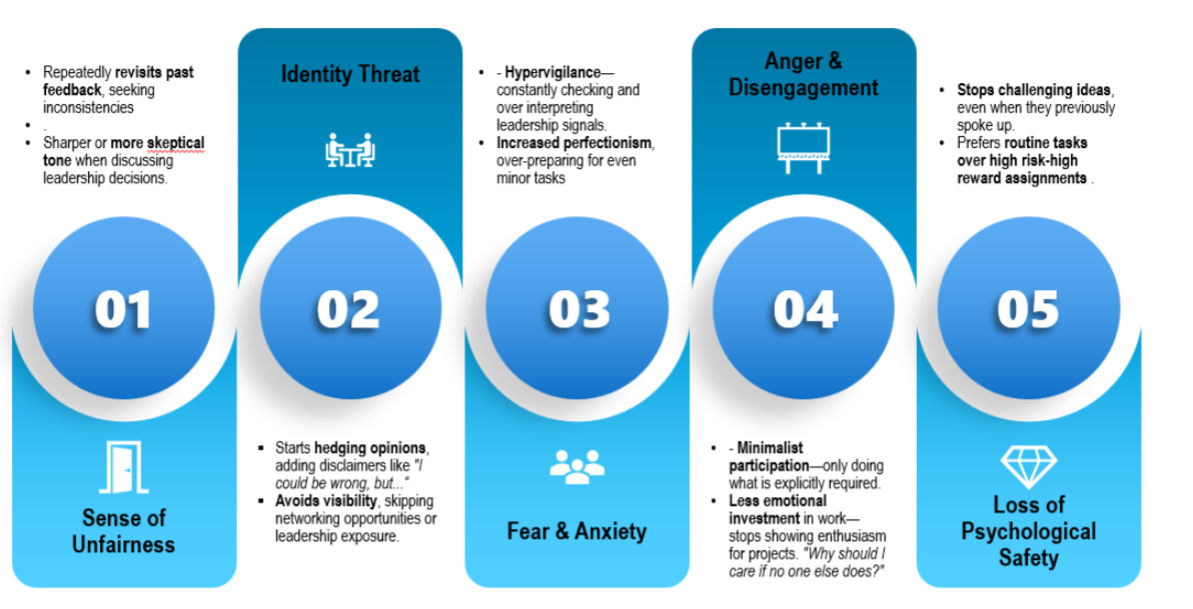Appraisals gone wrong can leave employees feeling anxious, rejected and disengaged. Drawing on psychological insights, Srideep Sarkar and Anu Sarkar explain how managers can navigate these moments with care. Learn how to rebuild trust, restore confidence and transform even the toughest performance conversations into catalysts for learning, resilience and growth.
Performance appraisals are meant to provide clarity, motivation, and a roadmap for growth. But for many employees, they bring frustration, disappointment, and even self-doubt. This is aptly indicated by a survey on performance management conducted by Mercer in 53 countries. It showed that only 5% of employees believed that their managers were skilled in having a candid dialogue about their performance.
Managers can play a critical role in helping employees reframe setbacks as growth opportunities rather than personal failures
The lack of skills shows in many ways: employees receiving last minute surprises, a further postponement of long-anticipated promotion, an unexpectedly poor rating, or being at the receiving end of forced rankings, the emotional impact can be profound.
Psychologically, a negative or unexpected performance review can threaten an individual’s sense of competence, autonomy, and belonging, three fundamental human needs identified in Self-Determination Theory. However, managers can play a critical role in restoring these needs, helping employees reframe setbacks as growth opportunities rather than personal failures.
The psychological fallout and how managers can respond
1. The sense of unfairness: “Why me?” (Cognitive dissonance and trust erosion)
When people believe they have worked hard and met expectations, a lower-than-expected rating or a declined promotion creates cognitive dissonance – the mental discomfort of holding conflicting beliefs. “I performed well” vs. “I’m being told I underperformed” creates internal conflict often leads to resentment, frustration, and a loss of trust in leadership. Research on organisational justice suggests that when employees perceive decisions as unfair, they become disengaged and resistant to feedback.
To mitigate this, managers must address procedural fairness, such as principles of neutrality, consistency, and accuracy. Transparency about criteria, calibration processes, and company-wide ranking methods can help employees make sense of their rating. More importantly, managers should validate the people’s emotions without being defensive. A response like, “I understand why this feels frustrating, and I want to work with you on what comes next,” helps rebuild trust and shifts focus on action rather than blame.
2. The identity threat: “Am I not good enough?” (Imposter syndrome and self-worth)
For many employees, work is deeply tied to their identity. When an appraisal signals underperformance or a lack of readiness for promotion, it can trigger identity threat. This is a psychological state where one’s self-concept feels challenged. Staff may experience imposter syndrome, doubt their past successes, and fear they are not as competent as they believed. Social Comparison Theory suggests that employees often measure their worth against colleagues, making a lower rating feel even more personal.
Managers must help employees separate self-worth from situational setbacks by emphasizing a growth mindset (Dweck, 2006). Framing the rating as a momentary dip rather than a defining judgment helps employees regain confidence. Instead of reinforcing a fixed perspective of “You need to improve”, managers can shift the narrative to “This is where you are today, and here’s how we can grow from here.” Providing concrete examples of past successes and micro-wins can help anchor employees’ self-belief, preventing them from over-identifying with one performance review.
3. Fear and anxiety: “What does this mean for my future?” (Uncertainty and threat perception)
A disappointing review does not just impact the present; it raises questions about the future. According to research on job insecurity, uncertainty about career progression triggers heightened stress responses like those seen in situations of physical danger. Employees may catastrophise, believing they are at risk of being laid off, missing future opportunities, or losing credibility among peers. This perceived loss of control often leads to avoidance behaviours, where employees hesitate to take on new challenges out of fear of further scrutiny.
The brain craves predictability (Neuroscience of Uncertainty, Hsu et al., 2005), so the best way to alleviate anxiety is by providing clarity. If job security is not at risk, managers should explicitly say so. If a promotion is delayed rather than denied, outlining clear, time-bound steps for progression restores a sense of control. By turning uncertainty into a structured pathway, managers help employees regain psychological safety and reduce stress-driven disengagement.
4. Anger and disengagement: “Why should I even try?” (Learned helplessness and motivation loss)
When employees feel their hard work was not recognised or fairly assessed, they may experience learned helplessness, a psychological state where individuals stop trying because they believe their efforts will not change outcomes (Seligman, 1972). This mindset fuels suboptimal behaviours. Employees do the bare minimum, withdraw from team discussions, and disengage from problem-solving.
To reverse learned helplessness, managers need to restore employees’ belief in effort-outcome connections. One way to do this is by offering small, meaningful wins such as ownership over a visible project, participation in a leadership meeting, or direct involvement in decision-making. Publicly recognising contributions, even outside the formal review process, can counteract the feeling of being overlooked. Encouraging self-efficacy (“I am capable of more”) rather than just compliance (“I need to work harder”) is key to reigniting motivation.
5. The loss of psychological safety: “I can’t take risks anymore” (Threat avoidance and risk aversion)
One of the biggest hidden consequences of performance disappointment is a shift in risk-taking behaviour. Member of staff who once took initiative and embraced challenges may start playing it safe, fearing further negative evaluations. Research on psychological safety (Edmondson, 1999) shows that when employees feel vulnerable or exposed, they avoid behaviours that could lead to failure, even if those behaviours are crucial for growth. This stagnation stifles innovation and long-term career development.
Rebuilding psychological safety requires explicit encouragement of experimentation. Managers should model risk-taking themselves. For example, sharing personal stories of setbacks and how they navigated them. Inviting employees into low-stakes opportunities to take initiative (such as leading a small team project) helps them rebuild confidence. Additionally, shifting focus from evaluating failure to rewarding learning reinforces that calculated risks are not only acceptable but expected.
Turning disappointment into growth
A performance appraisal should be a springboard for growth, not a fixed verdict on capability. Yet, when expectations are not met, the psychological response is often deeper than managers realise. By understanding how cognitive dissonance, identity threat, uncertainty, learned helplessness, and risk aversion shape employee reactions, managers can move beyond surface-level reassurance and proactively restore confidence, motivation, and engagement.
Srideep Sarkar is a Leadership Coach
Anu Sarkar is Director of Global Head of Leadership Strategy and Development at Deutsche Bank





